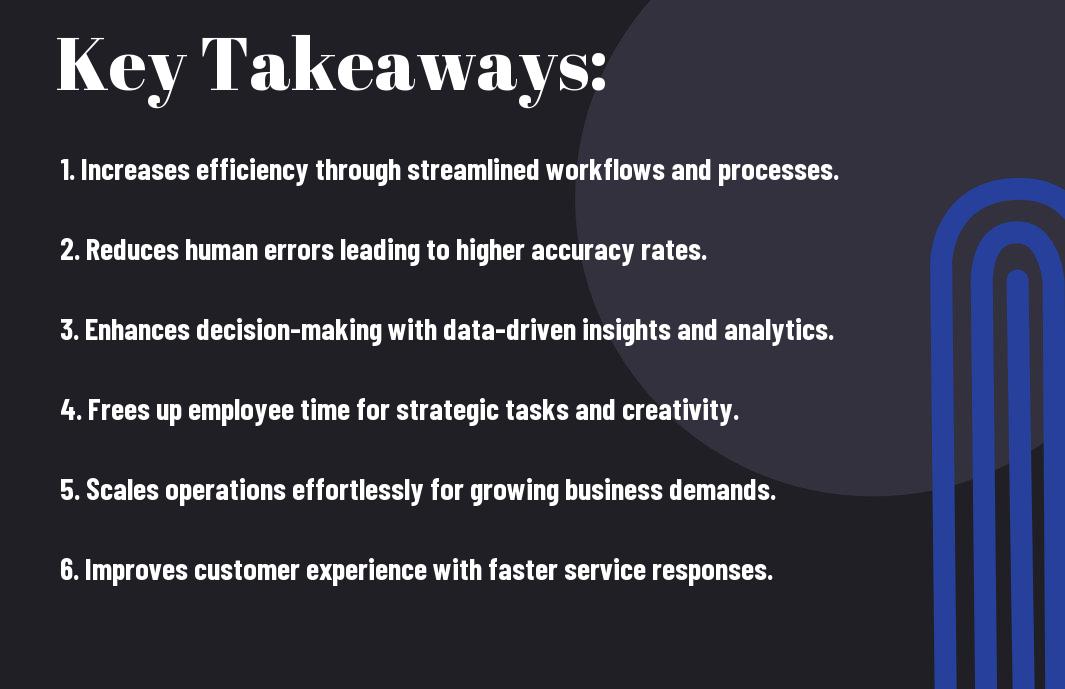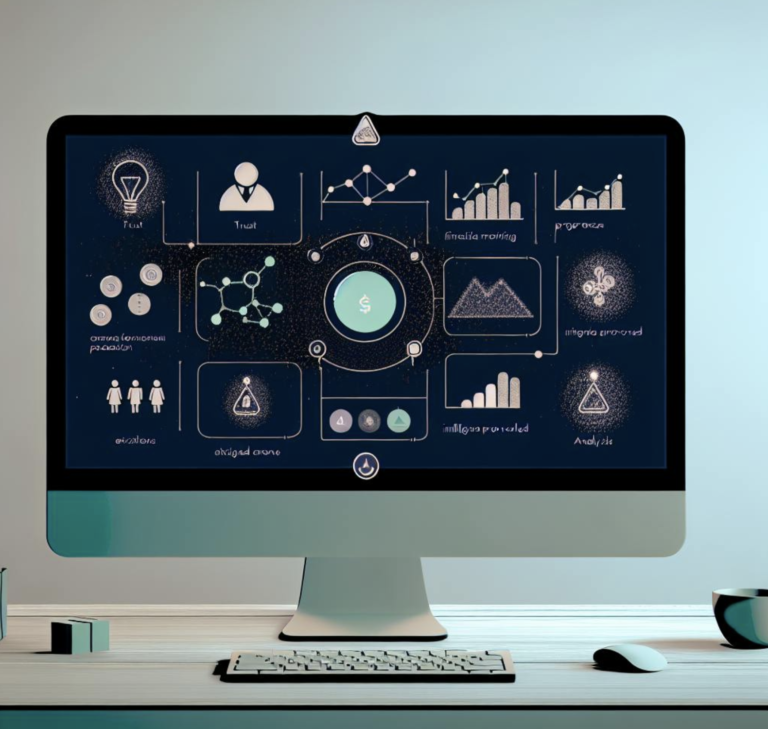ai business process automation
Just imagine transforming your operations with AI business process automation, a powerful technology that can streamline workflows and enhance efficiency. By utilizing AI, you can minimize manual tasks, reduce errors, and save valuable time for your team. However, it’s important to be aware of potential pitfalls, such as data security risks and integration challenges. Embracing this innovation not only boosts productivity but also positions your business competitively in a rapidly evolving market. In this post, you’ll discover how to effectively implement AI solutions and reap the benefits while navigating the associated risks.
Key Takeaways:
- Increased Efficiency: AI business process automation significantly boosts operational efficiency by reducing manual tasks and streamlining workflows.
- Cost Reduction: Implementing AI can lead to substantial cost savings, as it minimizes human errors and optimizes resource allocation.
- Enhanced Decision-Making: AI systems analyze vast amounts of data, providing insights that help businesses make informed, data-driven decisions.
Understanding AI in Business Process Automation
For businesses looking to increase efficiency and reduce operational costs, understanding AI’s capabilities in business process automation is vital. By leveraging AI technologies, you can transform routine tasks into automated processes, leading to improved productivity and more effective resource utilization. AI plays a pivotal role in analyzing vast amounts of data, making real-time decisions, and predicting future outcomes, ultimately enhancing your business processes.
Defining Business Process Automation
Above all, business process automation (BPA) refers to the use of technology to perform repetitive tasks and streamline workflows. By automating these processes, you not only reduce the likelihood of human error but also free up your team’s time, enabling them to focus on more strategic initiatives. The goal of BPA is to enhance efficiency and productivity across your organization, ultimately leading to better performance outcomes.
Role of AI in Streamlining Processes
Automation enhances efficiency through AI’s capabilities in analyzing patterns and optimizing processes.
Consequently, AI can significantly improve process efficiency by automating data entry, analyzing trends, and making informed decisions quicker than any human. It handles repetitive tasks, allowing you to focus on higher-value activities. By integrating AI into your business processes, you not only reduce operational costs but also minimize the risk of errors. This results in a streamlined operation where your resources are used effectively, ultimately driving growth and innovation in your business. Take your operations to the next level by embracing AI-powered solutions.
Key Technologies in AI Automation
It is imperative to understand the key technologies powering AI business process automation. These technologies streamline operations, enhance decision-making, and boost productivity. By leveraging capabilities like machine learning and natural language processing, you can ensure your organization remains competitive and efficient in an increasingly digital landscape.
Machine Learning
Along with traditional automation methods, machine learning enhances your ability to analyze large datasets, identify patterns, and make predictions. By employing algorithms that improve over time, you can optimize business processes and drive innovation in ways previously unachievable.
Natural Language Processing
On a similar note, natural language processing (NLP) allows your systems to comprehend and analyze human language. By integrating NLP, your organization can improve customer support, automate responses, and generate insights from text data.
To maximize the benefits of natural language processing, you should focus on its ability to convert unstructured data into actionable insights. With contextual understanding, NLP technologies can enhance customer interactions by enabling chatbots and virtual assistants to effectively resolve inquiries. Furthermore, you can utilize sentiment analysis to gauge customer feedback, providing a competitive advantage. By investing in NLP, your business can not only improve efficiency but also foster deeper connections with your clients.
Benefits of AI Business Process Automation
After implementing AI business process automation, you can unlock a host of benefits that transform your operations. This technology streamlines tasks, reduces errors, and allows your team to focus on strategic initiatives. In doing so, you not only enhance productivity but also improve service delivery, ensuring that you remain competitive in today’s fast-paced market.
Increased Efficiency
Along with reducing manual workload, AI business process automation optimizes workflows. This results in smoother operations where tasks are completed more quickly and accurately. By leveraging AI technology, you can allocate time and resources more effectively, paving the way for business growth.
Cost Reduction
Around every corner of your business, AI can lead to significant cost savings. By automating repetitive tasks, you decrease the need for extensive labor, which lowers operational costs. This gives you the financial flexibility to invest in other important areas of your business.
Hence, the potential for cost reduction is substantial. By minimizing human error and boosting productivity, AI allows you to achieve more with less. You can significantly slash labor costs while enjoying increased output. This means a healthier bottom line for your business, enabling you to reallocate resources toward growth initiatives or innovation. The financial benefits can transform your operational landscape, making AI not just an automation tool but a strategic asset for your company.

Implementation Strategies
Not all AI business process automation solutions are created equal; hence, it’s important to understand how to implement these strategies effectively. By leveraging insights from AI in business process automation: Use cases, benefits …, you can streamline your approach to achieving efficiency and effectiveness in your automation journey.
Assessing Business Needs
Around your organization’s workflow requirements, it’s vital to conduct a thorough assessment of your business needs to identify areas that will benefit most from AI-driven automation. Understanding these needs will guide your decision-making process and help prioritize tasks that require immediate attention.
Choosing the Right Tools
On your journey to implement AI business process automation, selecting the right tools is important for success. Start by evaluating existing AI technologies that align with your business objectives.
Streamline Your Business with Cutting-Edge Automation
Empower your business with powerful automation tools designed to enhance workflows, improve efficiency, and drive online impact.
Book a CallBut with a wide range of tools available, it’s imperative to consider factors like ease of integration, scalability, and user-friendliness. Ensure the tools you choose can adapt as your business evolves and incorporate feedback loops for continuous improvement. By selecting the proper tools, you’ll enhance your productivity while reducing the risk of disruption in your workflows.
Challenges and Considerations
Many businesses face significant challenges when implementing AI business process automation. These include concerns related to data quality, change management, and the overall understanding of AI technology. You must take these issues into account to ensure a smooth transition and a successful integration of AI into your processes.
Data Privacy and Security
The rise of AI in business process automation raises important questions about your data privacy and security. Ensuring compliance with data protection regulations while integrating AI solutions is important to protect sensitive information and maintain customer trust.
Integration with Existing Systems
An important factor in AI business process automation is how well the new systems integrate with your existing infrastructure. Poor integration can lead to increased costs and workflow disruptions, undermining the advantages AI is supposed to provide.
Plus, seamless integration enables you to maximize the benefits of AI technology while minimizing risks. By adopting an incremental approach, you can gradually integrate AI solutions without overwhelming your existing systems. Ensuring compatibility between new AI tools and legacy software is important. Additionally, consider the training needs of your team to ensure everyone can navigate both old and new systems effectively. This thoughtful approach not only minimizes disruptions but also enhances overall efficiency.

Case Studies and Applications
Unlike traditional methods, Artificial Intelligence is revolutionizing business process automation across various industries. Here are some illustrative case studies:
- Retail: A leading retailer improved order processing time by 40% by implementing AI-driven inventory management systems.
- Finance: A financial institution decreased transaction errors by 70% through the automation of compliance checks.
- Healthcare: A hospital utilized AI chatbots to handle patient inquiries, reducing response times by 60%.
- Manufacturing: A manufacturing firm optimized supply chain efficiency, realizing a 25% cost reduction.
For more insights, read about How AI is Transforming Business Automation in 2024.
Industry-Specific Examples
Behind every successful AI automation deployment lies an understanding of industry contexts. For example, the logistics sector employs AI for route optimization, leading to a 15% cut in fuel costs. In the customer service domain, AI chatbots have enhanced customer satisfaction ratings by 25%, showcasing the versatility of AI.
Lessons Learned
Any organization involved in AI implementation will gain valuable insights from their experiences. Common pitfalls include underestimating integration challenges and over-promising capabilities. It’s vital to approach AI with realistic expectations to leverage your organization’s full potential.
Indeed, embracing AI can significantly transform your business processes. Companies that adopted a phased integration strategy saw up to a 50% improvement in operational outputs, while those that rushed into implementation faced frustrating setbacks. Focus on testing, evaluating, and continuously adapting your strategies based on data to ensure success. Balancing ambition with caution is key, allowing you to capitalize on the benefits while mitigating risks.

To wrap up
Considering all points, AI business process automation can significantly enhance your organization’s efficiency and productivity. By integrating AI-driven tools, you can streamline repetitive tasks, reduce human errors, and free up valuable resources for strategic initiatives. It’s necessary to evaluate your current processes and identify areas where automation can bring tangible benefits to your operations. As you embrace this technology, you’ll position your business to capitalize on opportunities for growth and innovation in an increasingly competitive landscape.
FAQ about AI Business Process Automation
Q: What is AI business process automation?
A: AI business process automation refers to the use of artificial intelligence technologies to automate repetitive and rule-based tasks within an organization’s operations. This can include processes such as data entry, invoice processing, customer support, and more. By leveraging AI, businesses can improve efficiency, reduce human error, and free up employees to focus on more strategic tasks.
Q: What are the benefits of implementing AI in business process automation?
A: Implementing AI in business process automation offers multiple benefits, including increased efficiency through faster processing times, improved accuracy by minimizing errors associated with manual tasks, enhanced data analysis for better decision-making, and cost savings by reducing labor and operational expenses. Additionally, AI can help scale operations seamlessly as business demands change.
Q: Which types of processes are most suitable for AI automation?
A: Processes that involve high volumes of repetitive tasks, require detailed data processing, or follow clearly defined rules are typically the most suitable for AI automation. Examples include customer service inquiries, payroll processing, inventory management, and compliance reporting. Organizations should assess processes that consume significant resources without adding substantial value to identify opportunities for automation.
Q: How can businesses ensure a successful implementation of AI automation?
A: To ensure a successful implementation of AI automation, businesses should start by clearly defining their goals and objectives for automation. It is also advisable to conduct a thorough analysis of current processes to identify suitable candidates for automation. Engaging stakeholders, providing proper training to employees, and selecting the right AI tools and technologies are integral to a smooth transition. Continuous monitoring and refinement after implementation will help in achieving optimal results.
Q: What challenges might businesses face when adopting AI business process automation?
A: Businesses may encounter several challenges when adopting AI business process automation, including resistance to change from employees, the need for significant upfront investment in technology, potential integration issues with existing systems, and concerns about data security and privacy. Additionally, companies may struggle with selecting the appropriate AI solutions that fit their specific needs. Addressing these challenges requires careful planning, engagement with stakeholders, and possibly seeking expert guidance.







